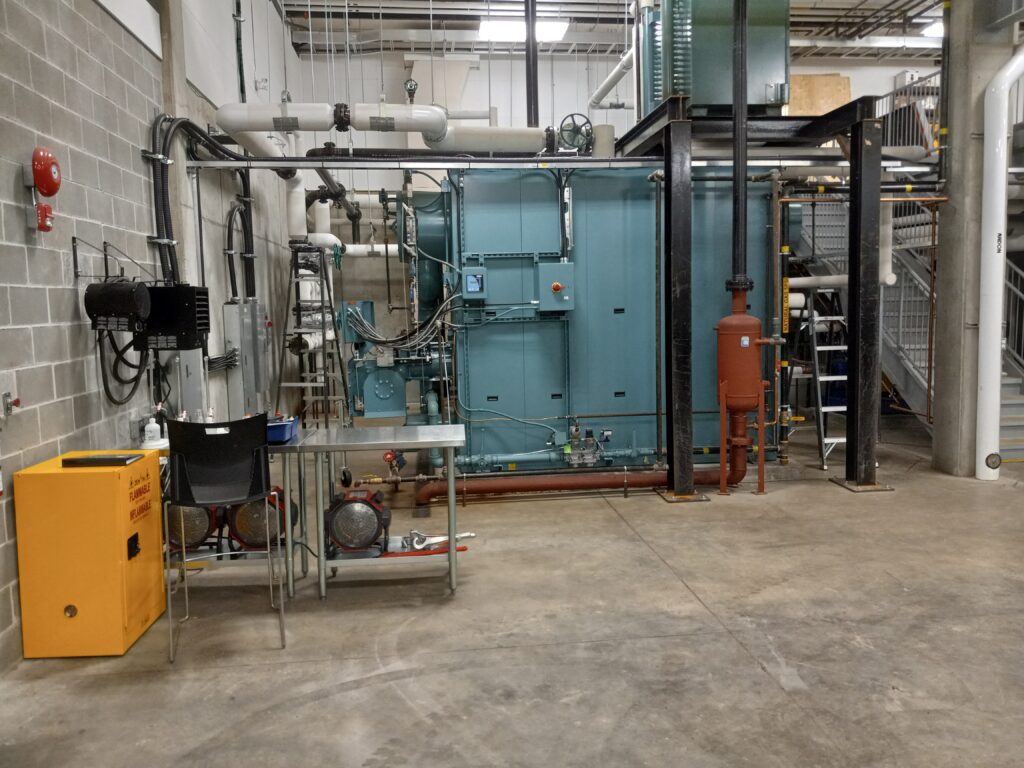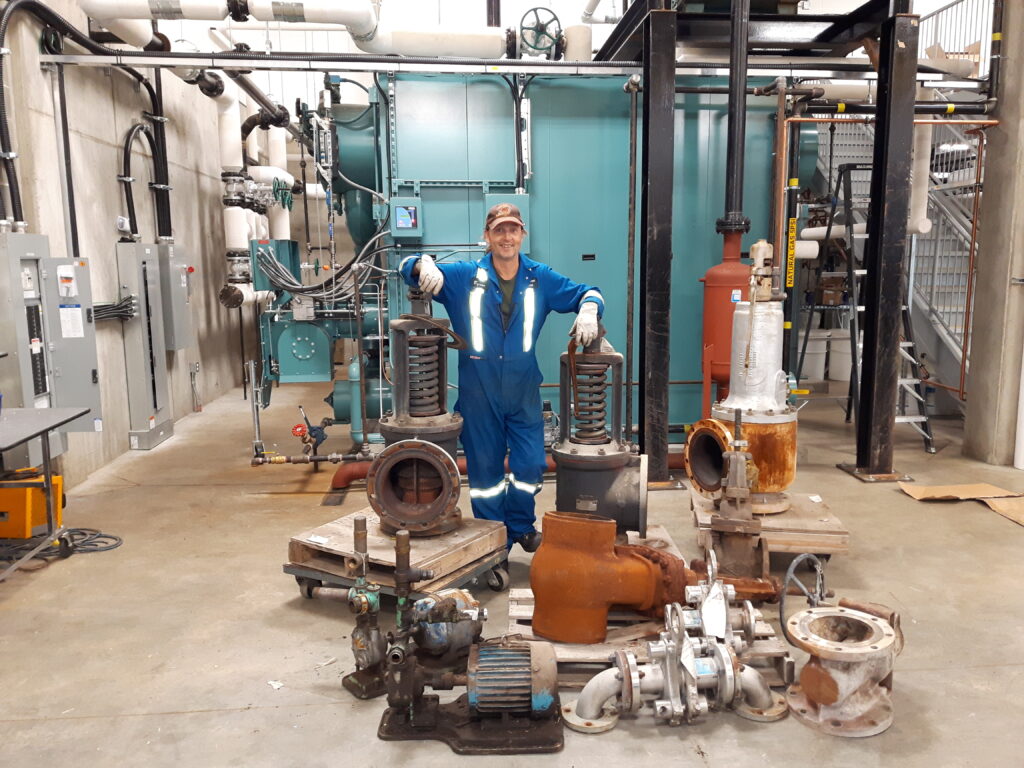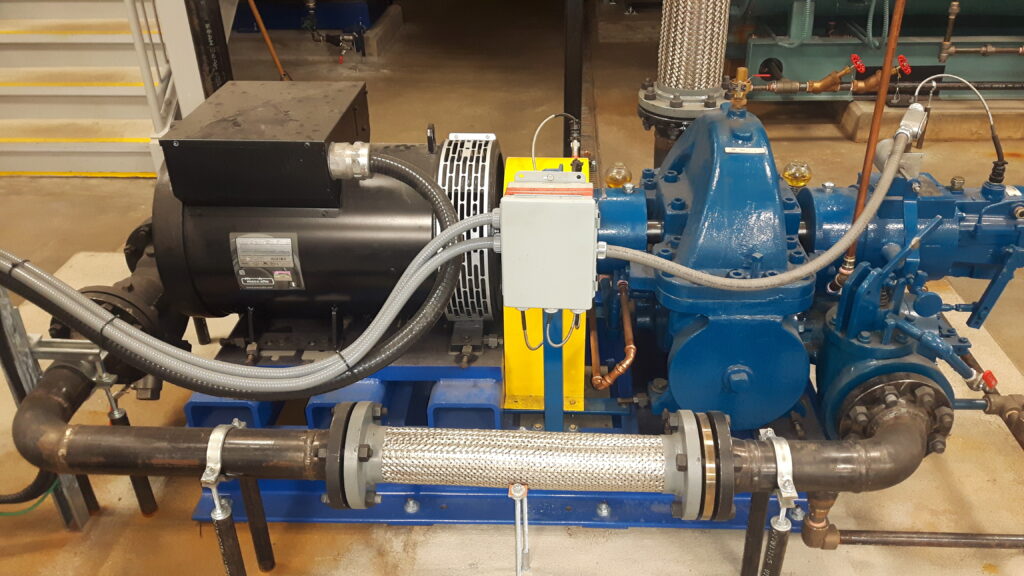
What is a Power Engineer?
Power Engineers are licensed to operate and maintain industrial power plants and commercial heating plants. This includes large refrigeration systems used in ice rinks and food processing plants. The variety of employment options are vast.
There are 5 classes of Power Engineering Certificate with 1st class being the top. The class of certificate required depends on the type and size of the plant, large industrial plants like pulpmills are 1st class and hospitals are 3rd or 4th class. Achieving higher classes is done by completing correspondence courses and accumulated work experience (firing time). It takes 10 – 20 years for most people to aquire enough firing time for a 1st class certificate, however a lot of people work their entire career with a 4th or 3rd class. Its really depends on the individual’s goals and what industry they choose.
A 4th Class Power Engineering Certificate will start you down a rewarding career path, that will open many doors
Program Details
This fasted paced 9 month program is comprised of 70% theory and 30% practical. Students with a high mechanical aptitude will find it easier than students without, however most students are successful if they put in an honest effort and are engaged in learning. Don’t worry if you’re not a math wizard, this program is designed for people who have been out of school for years. As long as you come in with a grade 10 level, you will be fine.
There are 2 provincial exams to be completed, they are administered through Technical Safety BC here in Kamloops. Each exam has 150 multiple choice questions and a 3.5 hr time limit. The first one (part A) is in mid December and Part B is in mid march, this is followed by 8 weeks practical training.
The practical is composed mainly of operational training, and what to look for during routine inspections of the plant. Students learn how to safely start up and shut down the plant by themselves. This involves bringing the boiler to operating pressure and warming all the piping so the turbine generator can be brought on line to produce electricity. They must also complete a hand drawn detailed map of the plant including all equipment and process piping, this is known as a process flow diagram.
Throughout the year students will go on several tours of industrial and commercial operations. This will give them a better understanding of the equipment and the processes they learned about in the classroom. It will also provide them with some insight into the type of industry they would prefer to work in.

Meet the Instructor
Welcome to Power Engineering!
My name is Byron Poppleton and I took the 4th Class Power Engineering program in 1986 and have been teaching since 2010.
I have over 20 years of experience in the Pulp industry and a strong background in maintenance.
In 2018, I was hired by TRU to build a 4th Class program, this included overseeing the design and installation of the steam training plant.
TRU INSTALLED A NEW TRAINING PLANT IN 2018

State of the Art Facility
- 2 high pressure steam boilers
- Auxiliary equipment – deaerator, condensers,
- Steam driven generator
- Produces enough power for 40 homes
- Exhaust steam is used as heat for the trades building.
Employers Favor These Programs
This program’s comprehensive training will prepare students for entry level positions in most industries. Many companies recognize the significance of these programs when it comes to the safety and training of new employees. Students leave the program with an increased understanding of industrial equipment, which leads to improved awareness toward safety and operations.
Work Environment
This varies depending on the industry and process you work in. Industrial and commercial plants both involve hot environments and lots of walking. Routine inspection rounds are performed several times a day to check the operating equipment for unusual noises, vibrations and leaks. Commercial environment tend to be cleaner than industrial settings like a biomass or coal power plant. Industrial plant equipment is often very large in size so the physical work can be much harder.
Work In A Variety Of Industries
Pulp & Paper
Power Generation
Hospitals
Recreation Complexes
Oil & Gas
Renewable Energy
Breweries
Food Processing
Industrial VS Commercial
Industrial and commercial plants are very different in that you are more of an operator in industrial and more of a maintenance person in commercial. Industrial plants are often large in size so they will have their own maintenance team, the operator identifies the problem area and calls the appropriate tradesperson to repair the equipment. Commercial involves more maintenance type work because the boiler or heating system operate in automatic mode. The maintenance activities can vary from changing a door knob to installing a water circulating pump. So for people who have mechanical skills or like fixing things, a commercial job may be a better choice.
Industrial plants offer better career advancement opportunities and better wages and benefits. Most industrial plants are 1st class and most commercial plants are 3rd or 4th class. You can only obtain 1 class above what the plant is rated for, so in a 4th class plant you can only get as high as a 3rd class certificate. Industrial plants are less abundant because most towns only have one where commercial may have several. Most towns have a hospital, recreation centre, hotels, schools.
A Sought After Certificate
Unlike a foundations program, you won’t need to find an apprentice position after completing the program, many Power Engineers work their whole career with a 4th Class certificate. There are plenty of job opportunities for all classes in a variety of industries.
Many 1st & 2nd class Power Engineers transition to senior management positions as they move through their career. These positions are mostly managing people and organizing maintenance activities, they are not operating the equipment.
Pay Scales
- 1st Class – $75+/hr
- 2nd Class – $50 – $75/hr
- 3rd Class – $35 – $50/hr
- 4th Class – $25 – $35/hr
These rates of pay will vary depending on the industry you are employed in but almost all of them will include some type of benefit plan. These benefits includes medical, dental, and a pension at a minimum.